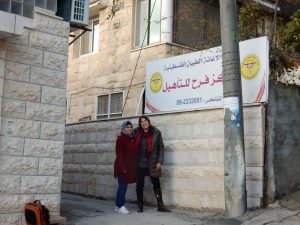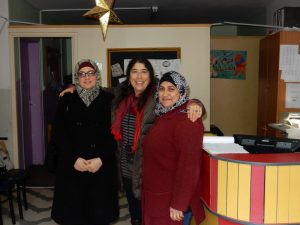We drive from southern Bani Na’im (northeast of Hebron) to the northern city of Nablus. The taxi is 40 minutes late and I practice slow breathing and accepting a fluid Palestinian concept of time. Everyone assures me it will be okay. For the two and a half hour drive I think about the families we have been visiting, the options for educated children, the limits for educated daughters, the fear of daughters studying abroad and falling in love with foreigners, the fierce enjoyment of small and intimate pleasures (a torrid love, passion, honor, and testosterone driven Bedouin soap opera from Jordan, a campfire under a full moon, all of us sitting on mattresses in a dry lunar landscape, the hills of Jordan glowing to the east, the loving intensity of family relationships). We head up route 60, get stopped at a flying checkpoint, the IDF sets up spikes in the road and then waves us through, we creep through multiple traffic jams.
Every Jewish settlement is marked but there is rarely a sign to the Palestinian villages that have been here long before 1967, a kind of geographical dispossession and erasure. We pass multiple army jeeps, guard towers, soldiers glued to their smart phones but always ready to spring into action, the combo of youth, boredom, and brutality. The landscape is dotted with villas (Palestinian Americans coming home) and villages, archeological sites, monasteries, and Bedouin encampments steeped in poverty and a deep attachment to the land. I think about the crazy up and down roads with their death defying hairpin turns, and miles of highway that Palestinians are “allowed” to travel and the resulting excess air pollution, challenged shock absorbers and brakes, and the endless waste of time and money that is the result of a system that keeps Jewish settlers separate from the indigenous population.
We speed through the once formidable and oppressive Huwarra checkpoint with its empty turnstiles and pens and cattle chutes (which can be reactivated any time) and enter Nablus, a dusty bustling city with a rundown feel, a central green park aspiring to grace, and snarling traffic, all sitting like a bowl amidst a circle of striking mountains, white apartments rising from the hills with IDF bases dotting the summits.
 We are visiting Raja Abu Rizik Khalilih, the powerhouse of a physical therapist and administrator who runs the Farah Center for Rehabilitation. The center has long accomplished extraordinary things particularly in the world of autism and speech pathology, with very little resources and faces frequent funding crises as a private NGO that offers free care to an impoverished population. Founded by Allam Jarrar, a visionary physician who worked in rehabilitation, public health, and was a leader in the Palestinian Medical Relief Society, (PMRS), the center is now directed by Dr. Mohammed, director of Rehabilitation Program for PMRS and has the same neurologist, Dr. Elana and staff that we have met before. In 2016 they served 366 new children with neurological illnesses. Raja explains that the Farah Center is unusual as it focuses on education and training for the mothers of the affected children. They offer workshops with preschools and families as well.
We are visiting Raja Abu Rizik Khalilih, the powerhouse of a physical therapist and administrator who runs the Farah Center for Rehabilitation. The center has long accomplished extraordinary things particularly in the world of autism and speech pathology, with very little resources and faces frequent funding crises as a private NGO that offers free care to an impoverished population. Founded by Allam Jarrar, a visionary physician who worked in rehabilitation, public health, and was a leader in the Palestinian Medical Relief Society, (PMRS), the center is now directed by Dr. Mohammed, director of Rehabilitation Program for PMRS and has the same neurologist, Dr. Elana and staff that we have met before. In 2016 they served 366 new children with neurological illnesses. Raja explains that the Farah Center is unusual as it focuses on education and training for the mothers of the affected children. They offer workshops with preschools and families as well.
 They plan to offer intensive programs and group activities and are hoping for better cooperation with the Ministry of Health. Their main support comes from the Diakonia Foundation in Jerusalem, they used to receive $60,000 per year, last year they received $39,000 and a surprise donation from American Jew for a Just Peace made it possible for programs and staff to continue their work.
They plan to offer intensive programs and group activities and are hoping for better cooperation with the Ministry of Health. Their main support comes from the Diakonia Foundation in Jerusalem, they used to receive $60,000 per year, last year they received $39,000 and a surprise donation from American Jew for a Just Peace made it possible for programs and staff to continue their work.
The general situation creates additional challenges. Last year there were many closures around Nablus and children as well as three staff from Jenin could not get to their appointments. They have an active Facebook page with education, videos and communication with their families. Raja says forcefully, “We are strong with you. We have future plans, we will keep in touch. If we achieve local contract, we are hoping for bigger developments, hoping for new building for five years. We are number one with pediatricians and families and education. This is new for our culture, the responsibility of the family, networking with the child, as well as establishing an appointment system (rather than walk-ins).” The center has many students who ultimately attend university and Rajah feels comfortable with the level of local control they have. She takes responsibility for administrative reporting and financial management. “Farah is home for us.” Even her own children have started volunteering at the center.
All too soon it is time to go to the Aida Refugee Camp in Bethlehem, leaving from the chaos of the main service and taxi station, after raucous negotiations and strategic planning and consultations with a cluster of drivers. Everyone has an opinion: go through Ramallah? Kalandia? Direct? The driver is smoking and seems angry about something. I decide to attach myself to a guy who speaks a little English and is heading to Bethlehem and pile into the van. The service fills up and soon we are off, a bundle of Palestinians and two Jewish Americans heading south across occupied Palestine.